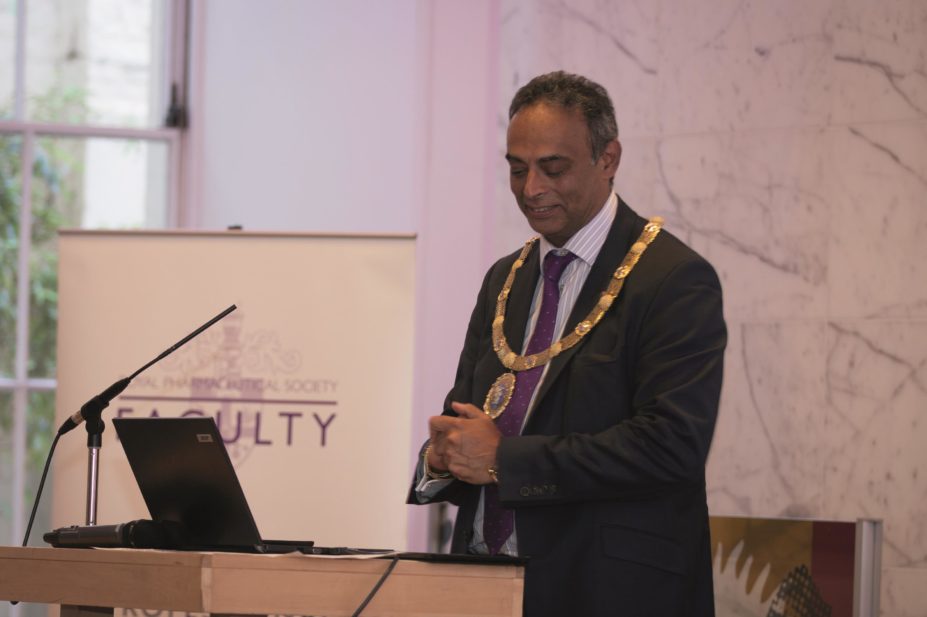
Jason Holmes
The Royal Pharmaceutical Society (RPS) Faculty celebrated its second anniversary at a ceremony in London on 4 June 2015, at which it encouraged members to join up in preparation for the upcoming continuing fitness to practice requirements.
In a speech at the event, president Ash Soni said RPS members should begin building a portfolio with the Faculty to be “ready” when the General Pharmaceutical Council (GPhC) announces its plans for continuing fitness to practice, the GPhC’s proposals for pharmacy revalidation. This is likely to require a portfolio and assessment to demonstrate ongoing competency.
The Faculty, established in 2013 as a professional recognition and development scheme for pharmacists, welcomed its latest members and Fellows at the event at the Royal Society, attended by around 125 pharmacists and RPS staff.
New members and Fellows were presented with certificates and pins to mark their completion of the assessment process. The Faculty now has 240 members and is targeting 200 new members by the end of 2015, a challenge set by the RPS Assembly at the beginning of 2015.
Addressing the event, Soni said the first two years had seen the Faculty establish a “solid process” of professional recognition that will assure the GPhC of members’ commitment to continuing their development and advancement, and that they can provide high-quality care.
Describing the Faculty’s plans for the next five years, Soni said he believed it would increasingly be seen as an essential aid for upcoming continuing fitness to practice requirements. The Faculty process was designed to align with the draft principles published by the GPhC in 2012.
“The quality of support, development and assessment processes is highly regarded,” he said. “It’s a model of support for continuing professional development that the GPhC has recognised and accredited as a gold standard for revalidation and continuing fitness to practice. And I do believe, for those of you [who] have friends and colleagues [in pharmacy], one of the things to be able to say to them is join the Faculty now, because it will help you through that continuing fitness to practice, which is going to come, and therefore [you’d] better get yourself ready for it and be there at that stage.”
Royal college aspirations
Soni confirmed the Faculty will launch an online development service later in 2015 to help members and Fellows maintain and develop their portfolio to be ready for reassessment in five years’ time. “It is envisaged that these entries will provide the evidence of true continuing professional development, required for fitness to practice,” he said.
Multiple presentations made reference to the RPS’s ongoing aspiration to become a royal college, with the Faculty central to this vision.
Patrick Stubbs, RPS director of marketing and membership, spoke on behalf of Faculty Board chair Peter Kopelman, who was unable to attend. Stubbs said the RPS wanted the Faculty to be seen as the “gold standard” for post-registration recognition and development. “Our aim is that on renewing your GPhC registration every year, proof from the royal college, the RPS, of your continued portfolio developments will provide the regulator with the necessary assurance that you have kept up to date and continued to advance and develop,” he said.
Cathy Geeson, deputy chief pharmacist at Luton and Dunstable University Hospital, was awarded Faculty membership at stage II in November 2014. She told the event how participating in the Faculty process had encouraged her to apply for an MSc in Advanced Pharmacy Practice. Geeson went on to be the first pharmacist to receive clinical academic research funding from the National Institute for Health Research.
“Without doing the MSc, I wouldn’t have been in the position to have the skills, knowledge or experience to put in that [research] application, and without the Faculty behind that, I wouldn’t have started doing the MSc,” she said.
Community pharmacist and Faculty Fellow Tracey Thornley, who has undertaken research into service development, said the Faculty could help more pharmacists conduct research into community pharmacy practice: “I was already involved in research before the Faculty support, but it absolutely made me analyse the work that I was doing, my own personal development and where I wanted to take my work.”

